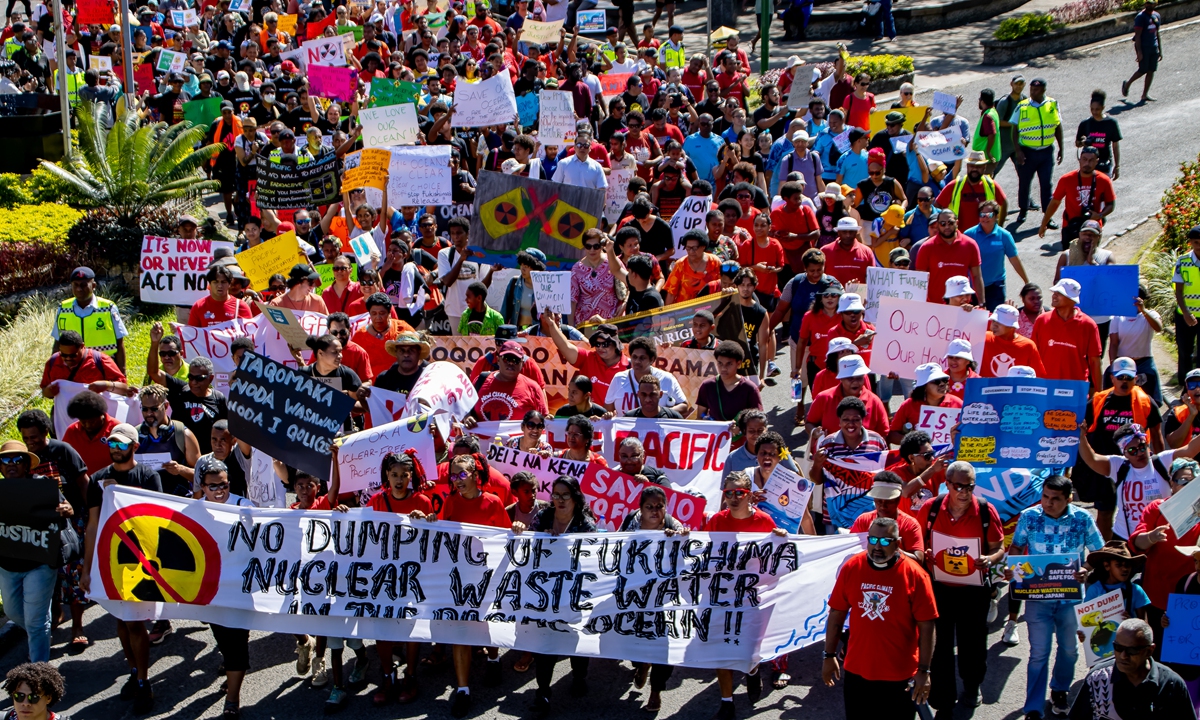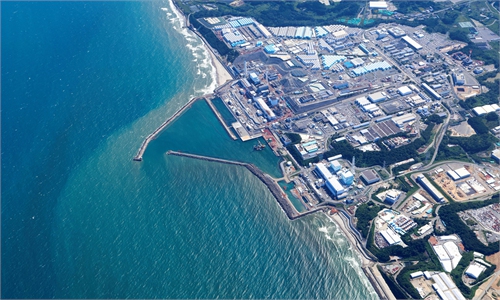Intl community condemns Japan's irresponsible dumping
Country to suffer economic losses, huge blow to image

Fijians take to the street to protest against Japan's dumping of nuclear-contaminated wastewater on August 25, 2023 in Suva, Fiji. Fijian media reported that a coalition of NGOs asked the Fijian government, and other Pacific Islands countries, to call for international action to stop Japan's planned dumping. Photo: VCG
International condemnation and public uproar have been accumulating since Japan opened the Pandora's box on Thursday and started its dumping of nuclear-contaminated wastewater into the ocean despite widespread opposition.
Observers believe that Japan's reckless actions will not only make itself suffer economic losses for mistrust over safety of local products, but also deal a huge blow to Japan's international image.
Japan should immediately rectify its selfish deeds that transfer the risk of nuclear contamination to the world, otherwise the Fukushima water will become the shame of Japan, Chinese Foreign Ministry spokesperson Wang Wenbin said on Friday at a routine press briefing.
In response to Japan's extremely selfish and irresponsible wrongdoing, China and other stakeholders have the right and responsibility to take legitimate, reasonable and necessary preventive measures to safeguard the safety of the marine environment, food safety and the health of the people, Wang said.
China announced an all-out ban on Japanese aquatic products on Friday, and the public concerns are not limited to seafood as many said they would avoid wider categories of goods from Japan, particularly cosmetics, and mother and baby products.
Japan is a popular travel destination for Chinese tourists and is among the latest batch of places where group tour service is resumed. But some customers have canceled the group tours to Japan they booked following the dumping of nuclear-contaminated wastewater, travel agents told news outlet Yicai.
The South Korean government, due to shared strategic interests with Japan as US allies, remained silent on the issue, but others are being more outspoken.
Lee Jae-myung, the leader of South Korea's opposition Democratic Party, condemned Japan for taking a path of environmental war criminal. Lee earlier called the dumping a "second Pacific War" - Japan, which invaded neighboring countries in the past, is attempting to bring about another irrevocable disaster to countries located on the Pacific Rim, Lee said.
South Korea's Justice Party held a press conference in front of Japanese Embassy in South Korea, denouncing Japan's plan to dump the contaminated water.
Surveys in South Korea show that more than 80 percent of respondents oppose the Japanese dumping plan and more than 60 percent said they won't eat seafood after the water dumping, Associated Press reported.
The Philippines did not express opposition to Japan, which was criticized by local fishers' group Pamalakaya. The group chair Ronnel Arambulo said the radioactive wastewater might reach the western part of the Pacific Ocean with the onset of the northeast monsoon, posing potential hazards in the country's eastern seas. "It will kill our fishermen and affect our food security," Arambulo told media.
The US, while giving the green light for Japan's irresponsible deeds, made the biggest step in decreasing imports of agricultural and aquatic products from Japan in the first half of 2023, per data from Japan.
The Japanese government and its supporters usually cite a report by the International Atomic Energy Agency (IAEA) in an attempt to prove the dump is safe, but analysts pointed out unpredictable scenarios and treatment failures are possible in the long term and that dumped water is irretrievable.
"Scientifically speaking, forms of harm caused by the nuclear-contaminated wastewater are unpredictable, as the side effects of the water's radioactive contamination won't become apparent in the short term," said law professor Chang Yen-chiang, who is also the executive director of the Yellow Sea and Bohai Sea Research Institute at Dalian Maritime University.
Chang mentioned the Minamata disease in Japan, which was caused by the consumption of fish and shellfish contaminated by a methylmercury compound discharged from a chemical plant. "The disease was not found out until 30 years after the discharge," Chang told the Global Times.
Japan's poor safety management and crisis response record has damaged the country's credibility. Just see how TEPCO's slow response dragged the tsunami-caused nuclear accident from level 3 to a much more severe level 7, a Chinese student living in Tokyo surnamed Lu told the Global Times on Friday.


